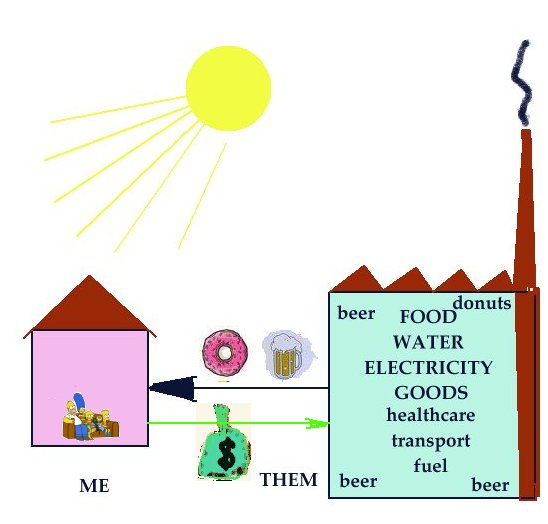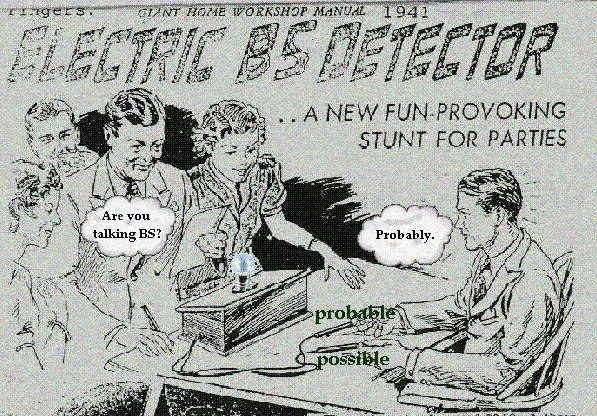We all have our personal beliefs; it's a part of being human. Mostly, we can believe just about anything we want at a purely philosophical level. But when we interact with others and with our environment, our beliefs may well cause harm to us, to others or to our environment.
It is possible to hold beliefs that cause harm without being held liable for that harm, or more likely: without ever becoming aware of that harm. Our entire global economy is founded on the division of labor. Producers, at first individuals, then groups, then regions and then whole nations make a speciality of producing some item of value which is exchanged with other, similarly specialised, producers.
Producers consume materials to provide ultimate end-users - UEUs - with goods and services. I avoid the term 'consumer', since producers are themselves consumers, but on a grander scale.
Producers, as I use the term here, include so-called 'productive' and 'non-productive' providers. Obviously, a manufacturer or refiner is a producer of physical items. Not so obvious is that all service industries, even down to strippagrams and hunkagrams consume materials to produce perceived value. Every single person in the service industries must consume some item of value - even if only a train fare or some wear and tear on shoes and clothing - in order to provide UEUs with perceived value.
Isolation
The modern consumer, the individual who buys goods, services, utilities etc. is isolated - or insulated - from almost the entire chain of the consumption of inputs which led to a consumable output. From the average consumer's perspective, goods come from some vague 'them'.

In our modern world, ordinary people may well believe that their daily needs are provided for by the beer fairy and the donut fairy - it doesn't matter, just as long as they can keep buying beer and donuts.
Testing A Belief
How can we show that one belief is true and another is false? Sometimes we just can't. If a person's mindset is a mind set in concrete then we may as well not argue with his or her beliefs. I hope never to meet such a person whilst performing jury service.
A jury in a criminal case is not supposed to convict unless each of them (or a majority in some instances) is convinced of guilt beyond a reasonable doubt. What does that mean? I cannot recall the exact case citation, but one judge put it to the jury in approximately these terms:
First you must examine all of the alleged facts and then you must ask yourselves:That jury instruction, in my opinion, is a logically sound basis for discovering whether or not any belief is worthy to be held by a rational person.
"Is it at all possible that the accused is guilty?"
If your answer is "No." then you must acquit, but if your answer is "Yes." then you must go on to ask yourselves:
"But is it likely?"
If your answer to that question is "No." then you must acquit.
How likely is it that a belief is true?
Using the judge's logic as above we can say:
IFF ( IF and only IF )
belief B is both possibly AND probably true
THEN
belief B is minimally plausible.
alternatively:
IF
EITHER it is impossible that belief B is true
OR it is improbable that belief B is true
OR both
THEN
belief B is maximally implausible.
Since we are using the techniques of scientific logic rather than law, it must be emphasised that we are simply discovering a way to determine what is minimally - I stress minimally - plausible. We are not saying belief B is, or may be, true: truth is another matter. We are investigating to see if we can honestly say: "Belief B is not entirely crazy." This does not prevent us from extending our conclusion to "Belief B is not entirely crazy, but ..."
If, in comparing two beliefs about the same thing, we have a '-but' for one only, then the other belief is to be preferred. Put another way: we should hold to whichever minimally plausible belief is maximally plausible. This is similar in application to Occam's Razor. "When you have two competing theories that make exactly the same predictions, the simpler one is the better."
Outside of pure logic there is no 'true' or 'false'. There are only degrees of certainty or doubt about what we believe. Regardless of any objective analysis of the logic behind a belief, the subjective impacts of reality are the final arbiters of the pragmatic value of a belief. Unfortunately, in our modern economy, it is both possible and highly probable that the person holding naive economic beliefs will not be subject to the socio-economic impacts of those beliefs.
--------------------------------------------------------------------------------------------------------
Of course, it is perfectly ok to appear to hold a crazy belief for purely comic intent.

-----------------------------------
Credits:
I would like to thank Gerhard Adam and Brian Taylor for some of the ideas and conversations that triggered this article.





Comments